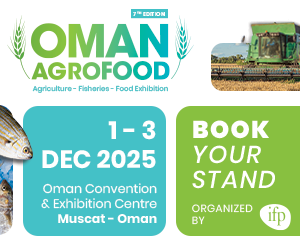Oman is advancing a pioneering initiative in seaweed cultivation as part of its broader strategy to strengthen the blue economy and support its climate and sustainability goals. The Ministry of Agriculture, Fisheries and Water Resources is backing a private-sector-led pilot project aimed at evaluating the feasibility of large-scale seaweed farming along the country’s coastline.
Spearheading the initiative is NTZ Solutions, a homegrown Omani company known for its work in carbon capture, waste management, and sustainability-driven human capital development. NTZ previously established the GCC’s first commercial biochar facility, now operating in Barka.
The seaweed cultivation project is being supported by MedcoEnergi, a state-owned Indonesian energy and natural resources firm. Together, the partners have launched a six-month pilot project to study the year-round viability of cultivating native seaweed species in Omani waters.
Speaking at a recent energy forum in Muscat, representatives from both NTZ Solutions and MedcoEnergi presented seaweed farming as a nature-based solution to several pressing global issues — including climate change, food security, and biodiversity loss.
“We never imagined seaweed could address the global crises we face today,” said Johan Despurwantoro, Sustainability and Risk Management Specialist at MedcoEnergi. “Nature-based solutions are not only environmentally sustainable but also economically transformative.”
Seaweed cultivation, he noted, can contribute to poverty alleviation, enhance nutritional security, and act as a sustainable alternative to synthetic agricultural inputs. It also plays a role in carbon sequestration, helping to offset emissions and build climate resilience.
In Oman, the project is aligned with key UN Sustainable Development Goals — notably SDG 13 (Climate Action), SDG 14 (Life Below Water), and SDG 2 (Zero Hunger). The initiative could also stimulate the development of a new value chain—from farming and transport to industrial processing—creating employment opportunities and in-country value.
Kawther Al Harrasi, Programme Manager at NTZ Solutions, confirmed that a dedicated pilot site has been secured at the Ministry’s research facility in Bandar Al Rowdha, Muscat. Of the 12 native seaweed species studied, six—Ulva, Codium, Sargassum, Kerva, Hypnea, and Gracilaria—were selected for their commercial potential in sectors like food, cosmetics, pharmaceuticals, and agriculture.
The next phase of the project will focus on scaling up production to support the manufacture of high-value products such as agar, carrageenan, bioplastics, and pharmaceutical compounds. Al Harrasi emphasized seaweed’s capacity for carbon capture and its broader economic and ecological impact on Oman’s marine economy.
Kamaruddin Azis of the COMMIT Foundation is also participating in the pilot as Project Facilitator, working alongside the NTZ and MedcoEnergi teams to refine cultivation methods and identify optimal growing conditions.
By tapping into the potential of seaweed farming, Oman is positioning itself at the forefront of sustainable marine innovation, contributing not only to its climate commitments but also to regional food and energy resilience.
Source: Oman Daily Observer











































































